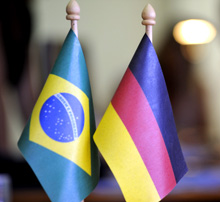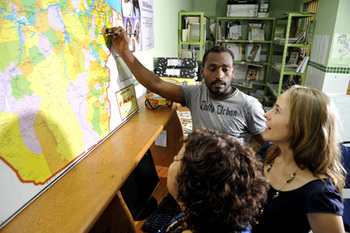Expert exchange and secondment programme
Project description
Project title: Expert exchange and secondment programme
Commissioned by: German Federal Ministry for Economic Cooperation and Development (BMZ)
Country: Brazil
Lead executing agency: Ministry of the Environment (MMA)
Overall term: 2014 to 2016

Context
Germany and Brazil have made commitments at international level to mitigate climate change and conserve biological diversity. Both countries face major challenges when it comes to putting an effective, global and thematically integrated environmental policy in place. They must constantly enhance and refine their expertise, actively shape debates on global and domestic environmental issues, and develop efficient environmental institutions. Brazil and Germany are supporting each other’s efforts in this regard and are seeking to promote continuing human capacity development and cooperation on a long-term bilateral basis.
Objective
Staff from the Brazilian Ministry of the Environment and its subordinate authorities have broadened their specialist knowledge, improved their intercultural expertise and strengthened their management skills through a professional exchange with colleagues of the German Federal Ministry for the Environment, Nature Conservation, Building and Nuclear Safety (BMUB) and with German and other European centres of excellence in the field of science, the private sector and civil society.
Approach
The further education programme is setting new standards by using a variety of methods and learning formats. Besides taking part in standard training components, such as language courses and visits to institutions, the participants also become acquainted with the day-to-day work of German and European partners. They benefit from direct sharing of sound practices and ideas on technical and organisational aspects that they can integrate into their own work; and they also gain the opportunity to network with the German colleagues. The ideas developed throughout the exchange are incorporated in a ‘transfer project’ and are part of the learning process undertaken by the participants. Coaching is provided during both the preparatory and follow-up phases of the process.
The programme was sponsored on a pilot basis by the German Government and conducted for the first time between 2014 and 2016 in cooperation with the Brazilian Ministry of the Environment and GIZ. GIZ’s Academy for International Cooperation developed and coordinated plans for continuing professional development and work experience placements and also organised the participants’ stays in Germany.
While the theme of the pilot programme was global environmental and climate policy, its structure can be transferred to other topics. The focus of the programme is on mutual learning as a way of fostering effective policy design and implementation.
Results
An innovative programme on knowledge sharing and mutual learning has been implemented for the first time, strengthening cooperation between Brazilian and German (environmental) institutions.
Cooperation relationships between the participating ministries and institutions have been strengthened through new and existing networks and contacts.

The programme is helping environmental experts to enhance their professional skills and knowledge.
Participants are helping to disseminate specialist and methodological know-how in the long term, for example, in the area of environmental mediation and negotiating strategies, and are fostering the use of the new contacts in their institutions.
The transfer projects are contributing on a lasting basis to advances in expertise and to improvements in the way institutions are managed.
The programme can be transferred cost effectively to other contexts, countries and institutions.